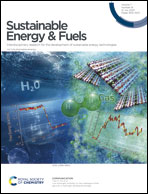Thermochemical behavior of alkali pretreated biomass – a thermogravimetric and Py-GC/FID study†
Abstract
The acidity of biomass pyrolysis oils (bio-oils) is problematic and may contribute to coking and catalyst deactivation during hydrotreating, reducing catalyst performance and the extent of hydrodeoxygenation. Clogging of trickle bed hydrotreatment reactors due to coke formation is the main hurdle that needs to be addressed to refine pyrolysis oils. Acetic acid is the highest concentration acid found in bio-oils and is a product of hemicellulose pyrolysis. By applying an alkali biomass pretreatment, commonly used in the pulp and paper industry for eliminating hemicellulose from lignocellulosic biomass, acetic acid production can be significantly reduced during pyrolysis. The extracted portions can be used as high-value co-products such as bio-fiber gum for use in food and non-food industries. To reduce bio-oil acidity, this study investigated the pyrolysis behavior of parent and alkali pretreated biomasses using thermogravimetric (TG) analyses and Py-GC/FID analyses. The TG results were analyzed with the aid of Friedman kinetics. Four energy crops and crop residues were studied: switchgrass, sorghum biomass, corn stover, and barley straw. The TG analysis shows significant differences associated with the removal of the hemicellulose fraction. However, similar overall activation energies associated with depolymerization reactions, mainly of cellulose and lignin, were observed for the parent and pretreated biomasses for all of the biomasses except sorghum. For sorghum, the parent biomass required a higher activation energy for thermal decomposition than the alkali pretreated sorghum, which was attributed to its high protein content. The Py-GC/FID results showed a significant decrease in acetic acid concentrations after alkali extraction, which was attributed to the lower hemicellulose concentration in the biomass after the extraction process. The alkali biomass pretreatment studied is a promising approach for reducing bio-oil acidity, however, further analysis is needed to determine the carbon efficiency of bio-oils produced using this approach.

- This article is part of the themed collection: Biorefining


 Please wait while we load your content...
Please wait while we load your content...